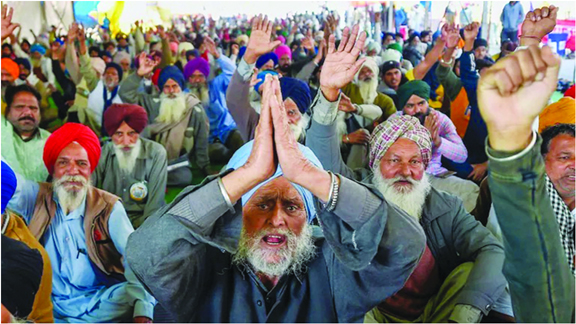
It has been over 200 days that farmers have been blocking the Singhu border and other areas just outside Delhi to protest the three contentious farm laws. But even as they continue the fight to get the government back to the negotiation table, a more pressing challenge confronts them now in the form of a second and more potent Covid-19 wave.
While India, and especially the Capital, is seeing unimaginable losses owing to the second wave, farmers’ unions at the Delhi border have refused to vacate the protest sites and are determined to continue the path of confrontation. In fact, one of the largest farmers’ organisations of Punjab, BKU (Ekta Ugrahan), has called for more people to join the protests starting this week.
What satellite images show us
The entire stretch along the Singhu border has turned into a township of sorts extending up to 4 kilometres in length. Hundreds of tents and makeshift accommodations have been set up to house protesters. This location is just on the other side of the Delhi border.
The entire 4-kilometre stretch imagery is an exclusive image shared by @detresfa_ to India Today, made available by Maxar Technologies and Google Maps.
Covid concerns
Growing concerns of a Covid spread in protest sites have often been discounted by protesters by comparing the congregations at Kumbh Mela and in election rallies across different states.
The protest sites have the potential of becoming a new Covid epicentre. In January 2021, the Supreme Court criticised the Centre for not ensuring strict enforcement of Covid protocols in protest sites. The civil surgeon’s office had offered to set up testing units at the protest sites, but farmers’ unions refused to cooperate.
BKU (Ekta Ugrahan) general secretary Sukhdev Singh spoke to journalists over concerns regarding the second Covid wave. He agreed there are concerns about the safety of protesting farmers and their families, but this was not the time to call off the protests. He opined that unless the government repealed the farm laws, they cannot afford to lose the gathered momentum.
Many of the farmers also cited the example of Shaheen Bagh, which used to be the epicentre of anti-CAA protests. The site was forcibly vacated because of Covid, and since then, the movement has lost all the gained momentum.
Singh, however, assured that they are taking necessary precautions and ensuring that everyone wears a mask and cooperates with officials at Covid testing centres set up near the protest sites.
Highway blockades and diversions
It is noteworthy that farmers have been protesting since October 2020 and as per the National Highway Authority of India (NHAI), these highway blockages have resulted in losses amounting to over Rs 600 crore owing to the non-functioning of toll plazas.
Farmers, on the other hand, claim over 300 of their brethren have lost lives during the protests. The governments of Haryana and Uttar Pradesh have enhanced pressure on farmers’ unions to vacate the protest sites on Delhi’s borders, namely Singhu, Tikri and Ghazipur.
The Union Home Ministry is working with the two BJP governments, along with the Congress government in Punjab, to make farmers’ unions understand the severity of the second wave. All three state governments have started conducting aerial surveillance of the protest sites and setting up makeshift testing centres for protesters.
Singhu and Tikri are two of the most important border points between Delhi and Haryana, and these continue to remain closed as of today. The Ghazipur crossing connecting Delhi and UP, however, is open for those travelling to Ghaziabad from Delhi, despite the other elevated highway continuing to remain blocked. Commuters have been asked to take routes passing through Anand Vihar, Loni DND and Apsara borders, and all carriageways connecting the Delhi-Noida Chilla borders are open right now.
There have also been accusations of protesters blocking the transport of liquid oxygen cylinders for medical use. Farmers’ unions, however, have denied this. The Samyukt Kisan Morcha, a representative body of several protesting farmers’ unions, said on April 21 that they have kept a way open for emergency services since Day One of their agitation.
Source: India Today





Be the first to comment